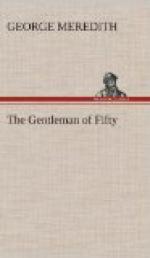I am, she told me, to see a monde of French people here in September. So, the story of me is to be completer, or continued in September. I could not get Miss Pollingray to tell me distinctly whether Madame la Marquise will be one of the guests. But I know that she is not a widow. In that case, she has a husband. In that case, what is the story of her relations towards Mr. Pollingray? There must be some story. He would not surely have so many portraits of her about the house (and they travel with him wherever he goes) if she were but a lovely face to him. I cannot understand it. They were frequent, constant visitors to one another’s estates in France; always together. Perhaps a man of Mr. Pollingray’s age, or perhaps M. le Marquis—and here I lose myself. French habits are so different from ours. One thing I am certain of: no charge can be brought against my Englishman. I read perfect rectitude in his face. I would cast anchor by him. He must have had a dreadful unhappiness.
Mama kept her promise by sending my riding habit and hat punctually, but I had run far ahead of all the wishes I had formed when I left home, and I half feared my ride out with Mr. Pollingray. That was before I had received Charles’s letter, letting me know the object of my invitation here. I require at times a morbid pride to keep me up to the work. I suppose I rode befittingly, for Mr. Pollingray praised my seat on horseback. I know I can ride, or feel the ‘blast of a horse like my own’ —as he calls it. Yet he never could have had a duller companion. My conversation was all yes and no, as if it went on a pair of crutches like a miserable cripple. I was humiliated and vexed. All the while I was trying to lead up to the French lady, and I could not commence with a single question. He appears to, have really cancelled the past in every respect save his calling me his goddaughter. His talk was of the English poor, and vegetation, and papa’s goodness to his old dames in Ickleworth parish, and defects in my education acknowledged by me, but not likely to restore me in my depressed state. The ride was beautiful. We went the length of a twelve-mile ridge between Ickleworth and Hillford, over high commons, with immense views on both sides, and through beech-woods, oakwoods, and furzy dells and downs spotted with juniper and yewtrees— old picnic haunts of mine, but Mr. Pollingray’s fresh delight in the landscape made them seem new and strange. Home through the valley.
The next day Miss Pollingray joined us, wearing a feutre gris and green plume, which looked exceedingly odd until you became accustomed to it. Her hair has decided gray streaks, and that, and the Queen Elizabeth nose, and the feutre gris!—but she is so kind, I could not even smile in my heart. It is singular that Mr. Pollingray, who’s but three years her junior, should look at least twenty years younger—at the very least. His moustache




